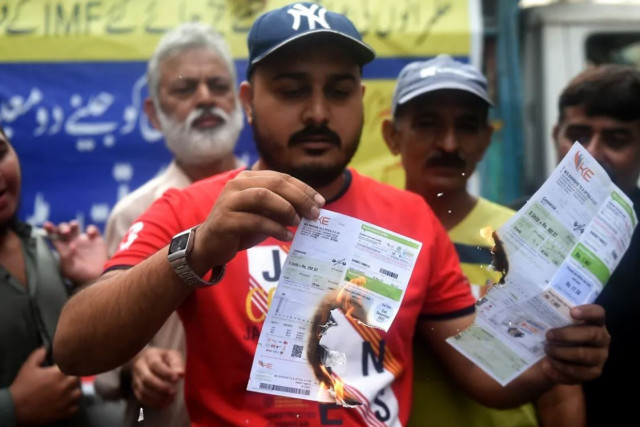Bloated power bills may trigger civil disobedience
Power Division officials tell Senate panel talks under way with IPPs, IMF to cut tariff

A parliamentary panel on Tuesday recommended the Power Division not to increase the power tariff for the consumers using less than 200 units per month, warning that inflated electricity bills could force the people towards civil disobedience in the country.
The Senate Standing Committee on Power met here with its Chairman Senator Saifullah Abro in the chair. During the meeting, the committee members grilled the Power Division and the power regulator officials over the inflated electricity bills, which triggered widespread public protests.
The members lamented “confused and complex policies” of the Power Division regarding provision of relief to the domestic consumers.
Read AJK shuts against bloated power bills
It unanimously called for the removal of tariff increase for those who were using less than 200 units unconditionally and without applying Clause 6 of the policy on a monthly basis.
The committee received a briefing from the Power Division.
After deliberating on the inflated bills issue, the chair concluded that the only resolution to this nation-wide crisis was to make efforts to review the memoranda signed with the independent power producers (IPPs).
“The estimated price should be re-evaluated as per legal framework,” the chair noted. “The IPPs should not work independently and without monitoring that leads to over-invoicing. The entire structure needs re-examination and review of clauses pertaining to misinformation and fraud.”
Observing that the entire power sector had been set up by the IPPs, the committee enquired on what basis the payments were made to the IPPs.
“The people of our country will never get relief until unqualified officers are being appointed in the Power Division,” he added.
The committee expressed its reservation on non-provision of 10-year breakdown of the payment made to the IPPs.
Read More SIFC meets with traders to discuss investment opportunities
“The IPPs, being the centre of the Power Division, should know details on their figure tips,” the chair noted.
The committee was informed that the government was negotiating with the IPPs to reduce the power tariff.
Of 46 IPPs, 34 had signed contracts during the previous government, while the finance ministry was negotiating with the International Monetary Fund (IMF), the officials said.
“We have to implement all conditions of the IMF.”
The committee asked about the breakdown of 44,943 megawatts (MW) installed capacity.
However, the Power Division officials were unable to give a satisfactory reply.
The chair asked about the demand of capacity payment by the IPPs, which the officials again failed to give a satisfactory answer.
The committee believed that the total consumption on the existing infrastructure would be 26,000MW. However the Power Division officials replied that the installed capacity, as a rule, must always be the double the maximum capacity.
The officials said that the people would benefit from the revised agreement with the IPPs.
The chair observed that the committee members were representing the entire Pakistan and stood together to redress the public grievance.
The committee sought details of the policy drafted on the issue of electricity theft and hooked connections. The meeting was informed that 78,000 cases had been registered, while complaint against 12,000 had been lodged across the country.
On the rebasing of the financial year 2022-23, the committee was informed that 63.5% of the total domestic consumers would have zero tariff increase and 31.6% would face tariff increase from, Rs3 to Rs6.5 per unit.
The officials said that only 4.9% of the total domestic consumers would face a tariff hike of Rs7.5 per unit, adding that the average tariff increase for domestic consumers would be around Rs3.82 per unit while in all other categories, the increase would be around Rs7.5 per unit.
The committee observed that the rebasing and tariff increase did not show uniformity. It stressed the need for drafting policies in favour of the vulnerable segments of the society rather than giving them shocks of tariff hikes every day.
The committee while discussing the budgeted subsidies for fiscal year 2024 was informed that that a subsidy of Rs976 billion had been reserved for the power sector, including Rs158 billion for distribution companies, and Rs169 billion for K-Electric (K-E), which would get an additional Rs126 billion.
The committee expressed serious concerns over the absence of the power secretary and the K-E chief executive officer (CEO).
The Power Division officials responded that the secretary had other important assignments, therefore, he could not attend the meeting.
Read Also Caretaker FM to visit UK next week
Senator Behramand Tangi said that the committee meeting was more important, adding that the Power Division should realise its responsibility towards provision of relief to the poor.
“We have to decide important issues regarding the relief on electricity bills,” the committee chair added.
Abro recalled that in the last meeting, he had issued summons for the appearance of the K-E CEO in the committee.
He added that the National Electric Power Regulatory Authority (Nepra) chairman and all its members were also called to attend the meeting.
“Electricity bills have become beyond the reach of the people. Why is the Nepra chairman showing non-seriousness in the matter,” Abro said.
He instructed the Nepra chairman to participate in the committee meeting along with the members.



















COMMENTS
Comments are moderated and generally will be posted if they are on-topic and not abusive.
For more information, please see our Comments FAQ